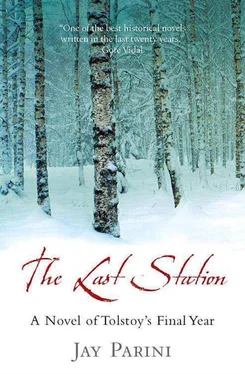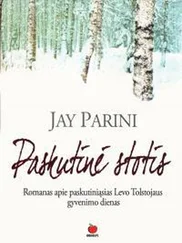Later, in a calmer mood, she implored Dushan Makovitsky to give her husband a small embroidered pillow that she had brought with her from Yasnaya Polyana. It was a favorite of his, she said. He would rest more easily with it tucked gently beneath his head.
Makovitsky is sentimental about such things and, stupidly, brought the pillow into the sickroom and set it on the bed. Leo Nikolayevich noticed it right away.
He said, ‘Where did that thing come from?’
‘Your daughter Tanya is here. She brought it,’ Makovitsky said.
The idiot!
‘Tanya! Let me see my daughter,’ he said. ‘Where is Tanya?’
Tanya, shaking and tearful, was led into the stationmaster’s cottage by Sasha. She embraced her father and wept on his shoulder.
‘Where is your mother, Tanya?’ he asked.
‘She remained at home.’
‘How is she? Is she going to come here?’
Tanya’s eyelids quivered. ‘I don’t think so…. I don’t know, Papa. There is no way to–’
‘To what?’
Tanya could hardly speak. Her father reached for her hand and told her not to worry, that he would be fine in a couple of days. ‘Ask Dr Nikitin,’ he said. ‘It’s just a rattle in the left lung. That lung has always been a problem.’
Tanya is hopelessly weak in character. And her sweetness is cloying. As Varvara Mikhailovna once said, she has the patience of old wallpaper.
Leo Nikolayevich called for his diary, whereupon he wrote in a wobbly hand:
Horrid night. Two days in bed, feverish. They say Sofya Andreyevna… The third of November, Tanya. Sergey came last night. I was extremely moved by his visit. Today, the third, Nikitin, Tanya, Goldenweiser, Gorbunov. And so my plan. …Fais ce que dois adv…. It’s for the good of others, I hope, but mostly for myself.
He rarely used French anymore – not like others of our class. But he chose a good proverb: ‘Do as you must, no matter what happens.’
Outside the cottage, it had become a circus. A reporter had found out about the visit to Shamardino, and he’d traced our whereabouts. The otherwise forgettable town of Astapovo became famous. Word spread like smallpox through the journalistic community, which feeds and survives on gossip. At first, a trickle of reporters joined us. Before long, the numbers swelled to a small throng, culminating with the arrival of Pathé newsmen, who carried cine cameras for shooting newsreels to be broadcast throughout the world. Now every train brought a fresh load of cameramen, copy editors, reporters, typists. The telegraph office was jammed, and Makovitsky was reduced to giving regular press conferences, announcing Tolstoy’s pulse and temperature, projecting the state of his health for the next few hours.
Mounted police arrived by order of the government, who feared, I suppose, a revolutionary uprising. They overestimate us greatly.
The railway people felt obliged to erect a large tent for the reporters and set up a dozen rows of cots. It was like an army camp, except for the sounds of typewriters clacking and cameras clicking. The Ryazan-Ural Railroad Company contributed a number of sleeping cars, which arrived this morning, and an unfinished warehouse was prepared for yet further platoons of gawkers, hangers-on, and so-called members of the press. If Leo Nikolayevich did not die, there would be hell to pay somewhere….
Sofya Andreyevna, for once, had an audience commensurate with her ego. She preened before the camera and supplied an endless stream of printable lies. She told them I was keeping her from her dying husband, so everyone assumed I must be a devil of the first rank. I should have expected this, but it was shameful of her all the same.
In any case, we succeeded, day by day, in preventing her from disturbing the tranquillity of Leo Nikolayevich, who at least pretended to believe he was alone in the country, surrounded by a circle of friends who sympathized with his view of life. He appeared happy, even serene, whenever the fever dropped and he could speak.
On Thursday morning, he said to Sasha, ‘I think I will die soon, but perhaps not. How can one know?’
‘Try not to think, Papa,’ she told him.
Her remark pricked him in the wrong place. ‘How is it possible not to think?’ he said. ‘I must think!’
Much of the time when he was conscious, I sat beside him and read passages from For Every Day , focusing on important chapters of the Gospels, the Upanishads, and the Analects of Confucius. Leo Nikolayevich often asked for something from Rousseau, too, though I tried to dissuade him from this old habit. He also insisted on Montaigne, another atheist. I could not understand this wish, either, but I acquiesced.
That night, Leo Nikolayevich suffered a number of small convulsions. He shook from head to toe, briefly; all the while his right hand held an imaginary pencil and scribbled on nonexistent paper.
Varvara Mikhailovna came noisily into the room, and Leo Nikolayevich startled. ‘Masha! Masha!’ he cried, then sank back into a stupor. He has never recovered from the death of his beloved daughter Masha. It hurt Sasha’s feelings that he would cry Masha’s name with such ferocity and obvious pain of loss.
On Friday, his condition worsened. The eminent Dr Berkenheim, a specialist in lung cases, arrived from Moscow, and he did not conceal his opinion.
‘It is the end, I’m afraid,’ he said.
‘It can’t be!’ Sasha said. ‘You’re quite wrong about this. His fever is down.’
But the fever was not down. It had been 103.6 for two days. The pulse became unbelievably rapid in the afternoon, so that we thought his heart might burst. Dushan Makovitsky was frantic, since he considered himself personally responsible for his patient’s pulse rate.
Dr Berkenheim had brought with him an arsenal of modern medicine: oxygen balloons, digitalin. But Leo Nikolayevich, distrusting modern medicine and its gadgetry, refused treatment.
His condition fluctuated hour by hour. He was perfectly coherent during dinner, ordering us about, discussing The Intermediary . By eight o’clock, he was delirious, calling to his long dead Aunt Toinette.
Tanya reappeared, and he said to her, ‘So much has fallen upon Sonya, my dear Sonya. She can’t stand this. It will kill her.’
‘Do you want to see her?’ Tanya asked. ‘Shall I call her?’
Everyone stiffened. What had got into her head?
Fortunately, her father said nothing. He looked at us, confused, and slumped into his pillow. His mouth sank into his toothless gums like a yeasty loaf of bread collapsing into itself.
Two more doctors arrived from Moscow, Dr Usov and Dr Shurovsky. Andrey and Ilya had summoned them. Incompetent hacks, they huddled in one corner and discussed the situation in pseudoscientific gibberish with Makovitsky, who looked painfully confused.
When Leo Nikolayevich saw them, he whispered to Tanya, ‘So this is it. The end. And it’s nothing.’
We stood about, stock-still. I was reminded of the time he almost died at Gaspra, nine years ago. Leo Nikolayevich had gone there to recuperate in the warm Crimean sun. He got worse at one point, and when it looked as though he might die, Sergey asked if he wanted to see the local priest, who had been begging for a final word with ‘the Count.’ Leo Nikolayevich replied, ‘Can’t they understand that even on one’s deathbed, two plus two is still four!’
Now Sasha hovered beside him, adjusting his pillow, smoothing the starched linen sheets, giving the blanket a tuck or tug.
‘My darling,’ he said. ‘You waste too much effort on an old man whose life is gone. There are many people in the world in need of your attention.’
‘Shush, Papa,’ she said.
Sofya Andreyevna, Andrey, and Ilya stood outside the cottage, a circle of hate, demanding entrance, but Dushan Makovitsky held them off like a brave lieutenant. He said that Leo Nikolayevich is much better today, that his temperature had dropped. Somehow, he managed to persuade them to return to their train.
Читать дальше












